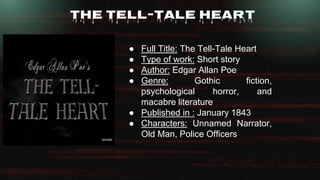The Tell Tale Heart.pptx
- 1. The Tell- Tale Heart Prepared by Nirali Dabhi
- 3. Edgar Allan Poe (1809-1849) ‚óè American writer, poet, author, editor, and literary critic known for his dark and macabre tales and poems. ‚óè Notable works "The Raven" and "The Tell-Tale Heart." ‚óè He is considered a pioneer in the genres of Gothic fiction and detective stories ‚óè Poe's mysterious death in 1849 at the age of 40 remains an enduring enigma.
- 4. The Tell-Tale Heart ‚óè Full Title: The Tell-Tale Heart ‚óè Type of work: Short story ‚óè Author: Edgar Allan Poe ‚óè Genre: Gothic fiction, psychological horror, and macabre literature ‚óè Published in : January 1843 ‚óè Characters: Unnamed Narrator, Old Man, Police Officers
- 5. ‚óè Edgar Allan Poe that revolves around a narrator who insists on their sanity while describing their obsession with an old man's vulture-like eye. ‚óè The narrator's obsession intensifies to the point where they decide to murder the old man to rid themselves of the eye. ‚óè After a meticulous planning, the murder is executed with precision. The narrator is consumed by guilt and becomes convinced they can hear the old man's heart beating beneath the floorboards where the body is hidden. ‚óè The sound becomes unbearable, leading to a confession and a descent into madness.
- 6. Point of View ‚óè The narration of the story is that of a first- person unreliable narrator. ‚óè The narrator is obviously deranged, readers learn during his telling of his tale, even though he declares at the outset that he is sane. ‚óè The narrative is filtered through the narrator's mind. ‚óè We call the narrator unreliable because his telling of the story is twisted and his vision is distorted by his madness.
- 7. Irony ‚óè The characterization of the narrator is ironical. While he insists that he is sane, we know that he is indeed insane. ‚óè A madman who is capable of logical reasoning and planning is also ironical. ‚óè All the time, the narrator thinks that the organ of sight, the Evil Eye, is so vexing; but in the end, a sound, the beating of the old man's heart, is what condemns the madman. ‚óè The guarding against one danger while being overcome by another constitutes irony.






